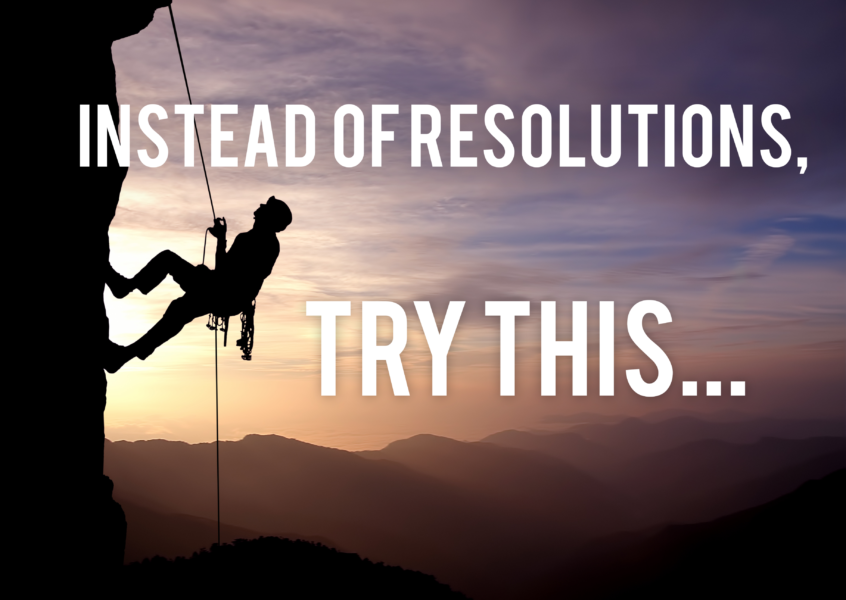Did you make a resolution last year, whether on New Year’s or during the year itself?
And if you did make a resolution or a promise to yourself, did you keep it?
If you didn’t succeed or stick with it, then I’m going to suggest something:
Don’t make another goal.
Instead: Figure out why you didn’t succeed with your last goal or resolution.
Because if you set your mind to doing something and you don’t do it, that generally means your “will power” failed you.
And when your will power fails you, it means there’s something else in your life that’s stronger than your promises to yourself.
So what’s stronger than your promises?
Your brain chemistry, your values hierarchy, and your beliefs.
I’m going to use a simple example, but you can extrapolate from this to any aspect of your life you want to change.
The example:
If you want to go on a diet, and you believe that you’re going to have to stop eating all the “guilty pleasure” food that you like, then you’re not very likely to succeed.
Why?
For a few reasons, among them:
1. Because you derive pleasure from the food you eat, otherwise you wouldn’t be eating it. And it’s hard to stop doing something you enjoy.
2. Because along with your eating habits and rituals, there’s accompanying brain circuitry and neurochemical levels to support them. (If you want to geek out on the science, here’s the latest research on the war in your brain between habits and goals.)
3. Because deep down, you have a surface-level limiting belief, such as thinking you won’t succeed or you’ll gain the weight back or you don’t really want to do it. And/or you have deeper limiting beliefs, such as thinking you’re not enough, you’re not lovable, or you’re not worthy.
So given all this, how do you make a resolution that sticks?
The answer:
Work from the inside out to change the belief that is keeping you stuck. And at the same time, work from the outside in by setting up a foolproof system that makes the old behavior nearly impossible, and over time changes the biology that keeps it in place.
So let’s return to the diet example.
I recently did the following to help someone who works with me and was nearing 300 pounds:
1. Inside-Out strategy
We sat down and I poured a pile of refined sugar on a plate. I had him eat a heaping spoonful as I explained in detail the worst effects of what he was putting into his body—how it feeds cancer, fuels inflammation, overloads your liver, weakens your bones, degrades focus and memory, turns your body into an acidic breeding ground for numerous diseases, and affects your genes so seriously that they turn off controls designed to protect you from diabetes and heart disease. I explained these things in detail, so he could make a new association with sugar. After that, he no longer believed that sugary foods were delicious. He believed that they were poison.
2. Outside-In strategy
The main place he ate poorly was at work. He’d stop at fast-food drive-through windows daily, and order among other things giant-sized sodas. So he agreed to prepare healthy meals each week and bring them to work. To make the system more foolproof, he agreed to leave his credit card at home and not take it to work, so that it would be impossible to even go to fast-food restaurants.
Now, your particular issue may not be around eating poorly, lack of exercise, smoking, mismanaging money, or an easily identifiable bad habit.
Sometimes, it’s something less obvious. For example, I was speaking to a new Society member yesterday who was frustrated because he’s hit a plateau in his career. He doesn’t know why and didn’t even know what his resolution should be.
As we spoke, I realized his limiting belief: He feels that taking care of his own needs is selfish, and that everyone else’s needs are more important than his.
This belief leads to him getting bogged down in emails and obligations he doesn’t want to or need to deal with, all while holding himself and his own ambition back.
While he’s going to do the inner-game work and attend intensives to change that belief in 2017, in the short term, he’s going to create systems that keep him from putting others before himself.
For example, he’s going to forward his email to a virtual assistant who will answer much it and politely decline most things for him, because he is otherwise unable to say no. While this might cost him some money, he will be able to earn much more with all that freed time.
So what I’m proposing for an incredible 2017 is not to make one-sentence resolutions, but to create a system instead that sets you up for success. It should be a foolproof system that makes success your only option.
The good news is that on average, after 66 days of using an effective system, your biology will start to change, and you will eventually be able to have some self-control and do it on your own.
You may need to recruit a friend or partner to help you enforce this. Because the other secret to making a change is accountability. So who’s going to hold you accountable this year?
Recently, there’s one thing I’ve realized that all my books about transformation have in common: I’ve done them in community.
So in addition to everything here, if you want to get healthier next year, surround yourself with healthy people. If you want to make more money or grow your career, surround yourself with motivated, successful people. And if you want to be the same next year, be around the same people you were last year.
Here’s to becoming the best you in 2017.
Optimizing Your Life with 84 Hacks, Systems, and Tips (plus great holiday gifts)

